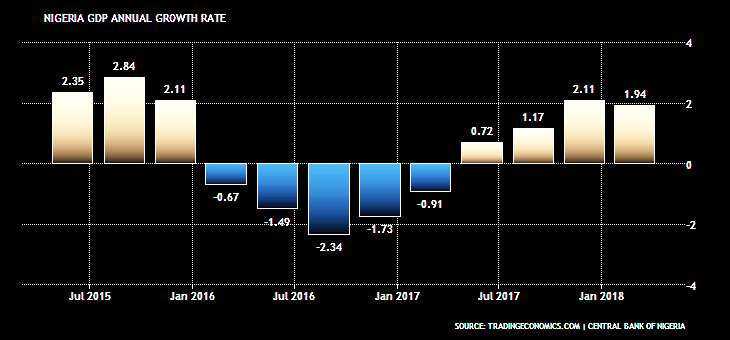
NIGERIA'S GDP UP 2%

IMF - An International Monetary Fund (IMF) staff team led by Amine Mati, Senior Resident Representative and Mission Chief for Nigeria, visited Nigeria from June 27 to July 9, 2018 to discuss recent economic and financial developments, update macroeconomic projections, and review reform implementation. At the end of the visit, Mr. Mati issued the following statement:
"Higher oil prices and short-term portfolio inflows have provided relief from external and fiscal pressures but the recovery remains challenging. International reserves remained stable at about $47 billion, supported by some convergence in existing foreign exchange windows, and despite some reversal of foreign inflows since April. Inflation declined to its lowest level in more than two years. Real GDP expanded by 2 percent in the first quarter of 2018 compared to the first quarter of last year. However, activity in the non-oil non-agricultural sector remains weak as lower purchasing power weighs on consumer demand and as credit risk continues to limit bank lending.
"Corporate tax collection efforts improved but revenue shortfalls and the late adoption of the 2018 budget impede its implementation. Revenue from higher oil prices is limited by net losses from retail fuel sales while non-oil revenue remains below expectations, with yields from tax administration measures—including the Voluntary Asset Income Declaration Scheme (VAID) and increased tax audits—yet to fully materialize. Current spending remains in line with expectations. Carryover from 2017 to 2018 helped increase capital spending in the first four months of 2018, despite delayed approval of the 2018 budget. Lower yields have kept interest payments within the budgeted envelope, but the Federal Government's interest-to-revenue ratio is expected to absorb more than half of revenues this year.
"Reforms to improve the business environment are progressing, including through identification of priority investment projects and the adoption of the Company and Allied Matters Act (CAMA)—a legislative landmark for private sector development. The implementation of the Power Sector Recovery Plan is advancing through a mini-grid policy, and regulations on eligible customers and meter asset providers.
"Under current policies, the outlook remains challenging. Growth would pick up to about 2 percent in 2018, weighed down by lower than expected oil production and relatively weak agriculture growth. The fiscal deficit would narrow slightly, with higher oil revenues offsetting increased spending, including those planned in a supplementary budget. Inflation would pick up in the second half of 2018 as base effects dissipate and higher spending and supply constraints in agriculture put pressure on prices. Increased oil exports would keep the current account in surplus, helping stabilize gross international reserves even if the current pace of foreign portfolio outflows continues.
"A coherent set of policies to reduce vulnerabilities and increase growth remains urgent. This includes specific and sustainable measures to increase the currently low tax revenue—including through avoiding new tax exemptions — and ensuring budget targets are adhered to even in an election year. This process should be supported by keeping monetary policy tight through appropriate monetary policy tools that will help contain inflationary pressures and support a move towards a uniform market-determined exchange rate. Moving ahead with structural reforms is needed to invigorate inclusive growth, particularly in the power sector where faster progress would be needed to ensure financing shortfalls in the sector are met in a sustainable manner.
"The team held productive discussions with senior government and central bank officials. It also met with representatives of the banking system, the private sector, civil society, and international development partners. The team wishes to thank the authorities and all those with whom they met for the productive discussions, excellent cooperation, and warm hospitality."
-----
Earlier:

2018, July, 11, 08:55:00
NIGERIA'S OIL INVESTMENT $10 BLNBLOOMBERG - The $10 billion refinery, set to be one of the world’s largest and process 650,000 barrels of crude a day, should be near full capacity by mid-2020, Edwin Devakumar, group executive director at Dangote Industries Ltd., said in an interview at the coastal site, about an hour’s drive east of Lagos. |

2018, June, 20, 12:30:00
NIGERIAN OIL SALESPLATTS - Nigerian oil has been slow to sell this month as bidders for the country's July-loading heavy and light sweet crudes have been absent from the market. Market participants pegged the amount of unsold Nigerian barrels loading in July at 20 million-34 million barrels, amounting to roughly 40%-75% of what is produced in a month. |

2018, May, 16, 12:00:00
HEAVY NIGERIAN OILBLOOMBERG - Nigerian National Petroleum Corp., the Abuja-based behemoth that dominates the OPEC member’s energy industry, has made losses for at least the last three years, |

2018, May, 14, 10:55:00
NIGERIA'S OIL PRODUCTION 2.07 MBDPLATTS - Nigeria's oil production rebounded to 2.07 million b/d in April this year, after it slipped to 2.02 million b/d in the preceding month, according to estimates released Thursday by the oil ministry. |

2018, May, 7, 08:25:00
WBG WANTS NIGERIAWBG - For Nigeria to tap its spatial drivers of development, policymakers may want to focus on investments that reinforce clusters and economies of scale; optimize the connectivity between rural areas and the major urban markets; and address structural and land management issues in major urban nodes and along major growth corridors to remove or alleviate barriers that undermine the growth potential. |

2018, March, 18, 11:25:00
NIGERIA NEED CHANGESPLATTS - The objective of this program is to increase its domestic refinery utilization rates to 90% from current levels of 10-20%, Kragha said speaking to Platts in Cape Town on the sidelines of the African Refiner Association conference. |

2018, February, 27, 13:05:00
NIGERIA'S ECONOMY UP TO 1.92%REUTERS - Oil production rose to 1.91 million barrels a day (mbpd) in the last quarter of 2017 compared with 1.76 mbpd in the same period of 2016, the statistics office said. |











